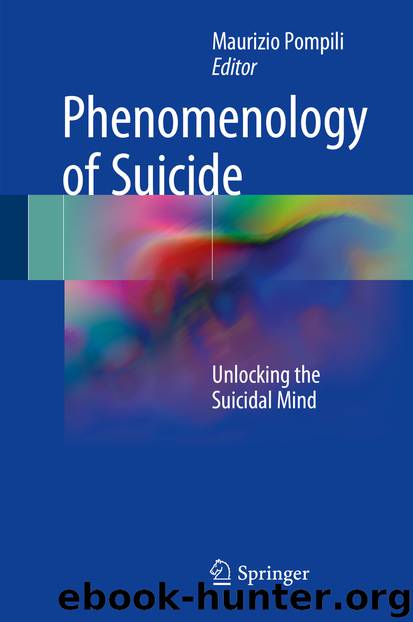Phenomenology of Suicide by Maurizio Pompili

Author:Maurizio Pompili
Language: eng
Format: epub
Publisher: Springer International Publishing, Cham
6.7.3.3 Third Step, Analysis of Empathic Data
Immediately after the empathic moment, it is necessary for the clinician to recover his cognitive analysis capacity and interpret the emotional information gathered at the previous step. In order to do it, the clinician needs to deregulate empathic resonance, so that he can intentionally shift his focus of attention on elements external to the environment, change posture or move to another task, such as counting since, as we have seen, this task can downregulate the empathic response. At that point, the analysis of empathic information is cognitive, based on the memories gathered some instants before, which complement other information in his possession.
Conclusions
We believe that empathy, if understood in its characteristic mechanisms and rules, can turn into a powerful tool available to the clinician, who has to deal with difficult situations and patients.
The suicidal individual is a particularly challenging category of patients, for whom the emotional dimension plays a key role in the genesis of their suffering, perceived as intolerable. Accordingly, we believe that the clinician that strategically equips himself with greater ability and knowledge of the empathic function, which is our window to other’s emotions, ensures a precious help in the management of this type of patients.
Also, it is important that, in the future, efforts are devoted to make the patient-clinician relationship more scientific and predictable. First, in order to optimise the therapeutic results thanks to a better investigation ability on the patient. Secondly, it is now supported by evidence that the patient’s health cannot be obtained only through treating pathologies, but mandatorily by treating the entire person, both in the physical, emotional and cognitive spheres (Davidson et al. 2003). In this direction, the relationship with the clinician is of great importance, given the power that this relationship has to trigger emotions in the patient, emotions that, in turn, reflect on physiological states and that can positively or negatively affect the underlying pathology.
Finally, we believe that this effort is urgent, in order to adequately respond to the increasing sense of distrust that people manifest towards clinicians, which is leading to such phenomena as the stigmatisation of science and evidence-based medicine or as the bad habit to have a do-it-yourself healthcare only relying on anecdotal information available on the web.
Download
This site does not store any files on its server. We only index and link to content provided by other sites. Please contact the content providers to delete copyright contents if any and email us, we'll remove relevant links or contents immediately.
Periodization Training for Sports by Tudor Bompa(8241)
Why We Sleep: Unlocking the Power of Sleep and Dreams by Matthew Walker(6688)
Paper Towns by Green John(5169)
The Immortal Life of Henrietta Lacks by Rebecca Skloot(4570)
The Sports Rules Book by Human Kinetics(4374)
Dynamic Alignment Through Imagery by Eric Franklin(4202)
ACSM's Complete Guide to Fitness & Health by ACSM(4044)
Kaplan MCAT Organic Chemistry Review: Created for MCAT 2015 (Kaplan Test Prep) by Kaplan(3994)
Livewired by David Eagleman(3757)
Introduction to Kinesiology by Shirl J. Hoffman(3756)
The Death of the Heart by Elizabeth Bowen(3599)
The River of Consciousness by Oliver Sacks(3590)
Alchemy and Alchemists by C. J. S. Thompson(3506)
Bad Pharma by Ben Goldacre(3415)
Descartes' Error by Antonio Damasio(3264)
The Emperor of All Maladies: A Biography of Cancer by Siddhartha Mukherjee(3135)
The Gene: An Intimate History by Siddhartha Mukherjee(3087)
The Fate of Rome: Climate, Disease, and the End of an Empire (The Princeton History of the Ancient World) by Kyle Harper(3051)
Kaplan MCAT Behavioral Sciences Review: Created for MCAT 2015 (Kaplan Test Prep) by Kaplan(2975)
